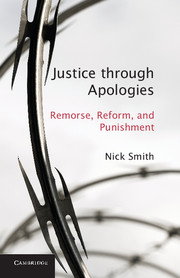
-
Select format
-
- Publisher:
- Cambridge University Press
- Publication date:
- 05 June 2014
- 24 March 2014
- ISBN:
- 9780511843969
- 9781107007543
- 9780521189453
- Dimensions:
- (228 x 152 mm)
- Weight & Pages:
- 0.73kg, 418 Pages
- Dimensions:
- (228 x 152 mm)
- Weight & Pages:
- 0.57kg, 413 Pages
- Subjects:
- Law, Jurisprudence
Book description
In this follow up to I Was Wrong: The Meanings of Apologies, Nick Smith expands his ambitious theories of categorical apologies to civil and criminal law. After rejecting court-ordered apologies as unjustifiable humiliation, this book explains that penitentiaries were originally designed to bring about penance - something like apology - and that this tradition has been lost in the assembly line of mass incarceration. Smith argues that the state should modernize these principles and techniques to reduce punishments for offenders who demonstrate moral transformation through apologizing. Smith also explains the counterintuitive situation whereby apologies come to have considerable financial worth in civil cases because victims associate them with priceless matters of the soul. Such confusions allow powerful wrongdoers to manipulate perceptions to disastrous effect, such as when corporations or governments assert that apologies do not equate to accepting blame or require reform or redress.
Reviews
'In I was Wrong, Nick Smith provided a unique and richly complex introduction to the world of apologies. Now, in this engaging follow up, Justice through Apologies, he has extended his analysis into their use in criminal and civil law. A feature of his earlier book - wonderful illustrations and endless provocative questions - graces the present one, challenging glibness and ensuring that his work will remain a go-to resource for those who, like Smith, are both impressed by the moral power of apologies but troubled by their performative exploitation.'
John Kleinig - Emeritus, Department of Criminal Justice, John Jay College of Criminal Justice
'The notion of apology is a complex phenomenon - it implicates timeless questions of ethics and morality, but it also has become a ritual in public and political life at time of great media scrutiny of our leaders, and of course it also is embedded in formal legal procedure at a time when most convictions result from guilty pleas and most lawsuits result in settlements. Nick Smith's new book addresses all these aspects of apology and remorse, and it should be fascinating for a wide variety of audiences. It is at once a deep essay in the mode of moral philosophy, a broad-ranging work of social anthropology, and a rigorous work of legal analysis.'
Robert Weisberg - Stanford Law School
'Smith’s theoretical discussion of apology in law is a major contribution to our understanding of both the range of objections that might be raised to apology reductions as well as the interlocking reasons for accepting apology reductions. This is, quite simply, an impressively systematic and comprehensive account.'
Cheshire Calhoun - Arizona State University
Contents
Metrics
Altmetric attention score
Full text views
Full text views help Loading metrics...
Loading metrics...
* Views captured on Cambridge Core between #date#. This data will be updated every 24 hours.
Usage data cannot currently be displayed.
Accessibility standard: Unknown
Why this information is here
This section outlines the accessibility features of this content - including support for screen readers, full keyboard navigation and high-contrast display options. This may not be relevant for you.
Accessibility Information
Accessibility compliance for the PDF of this book is currently unknown and may be updated in the future.


